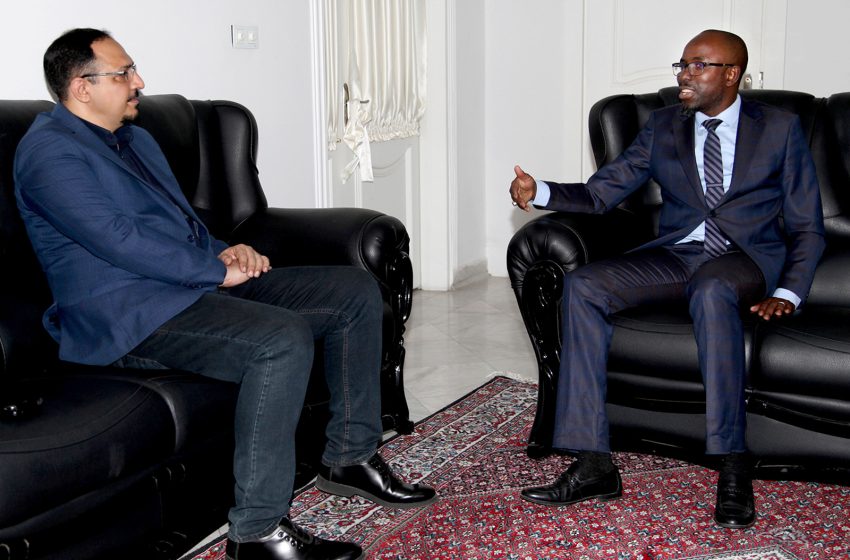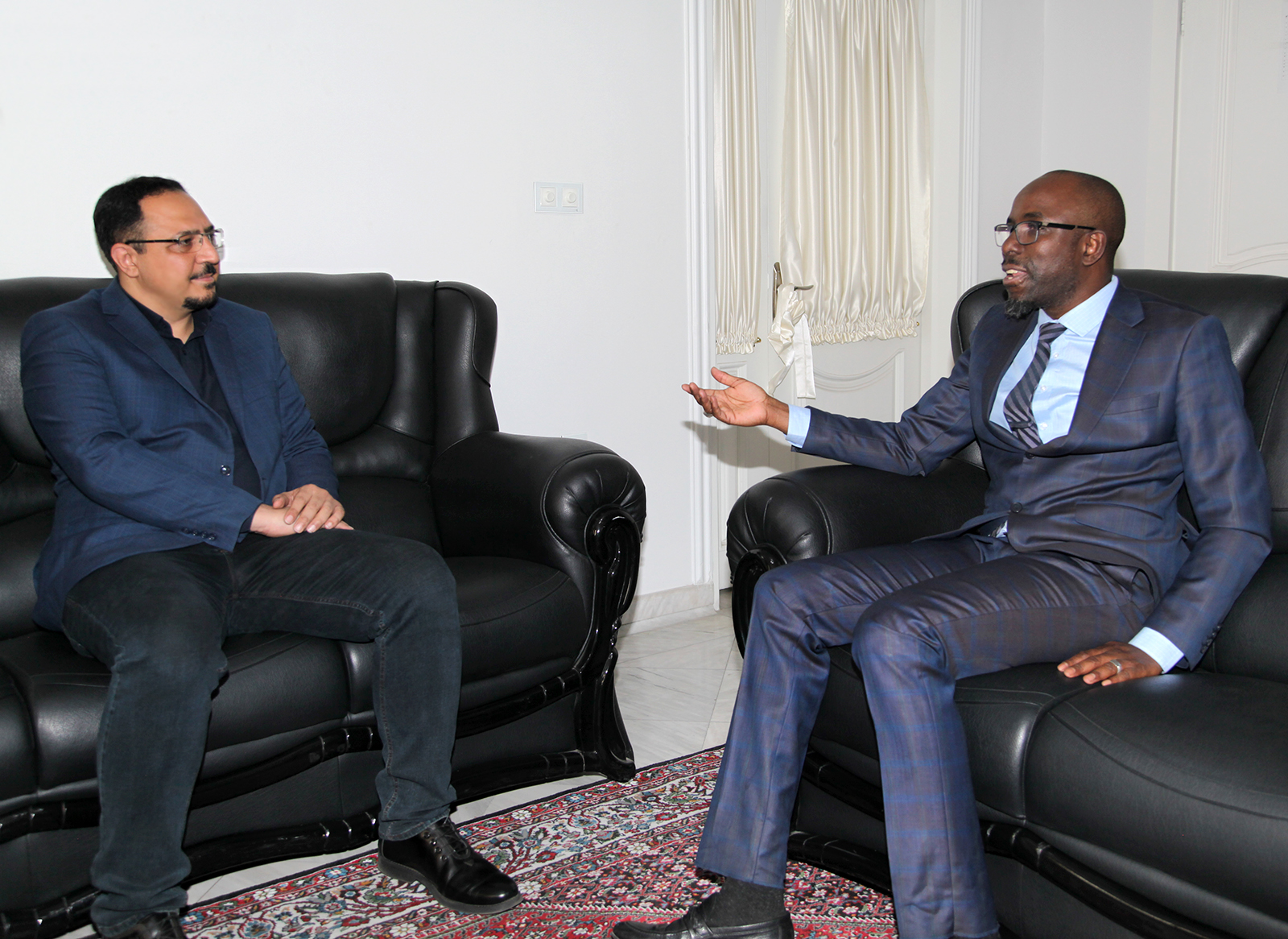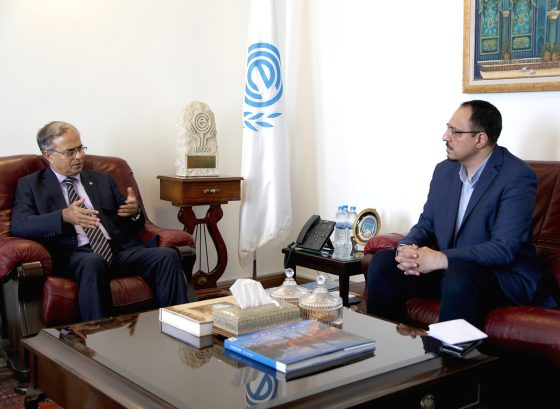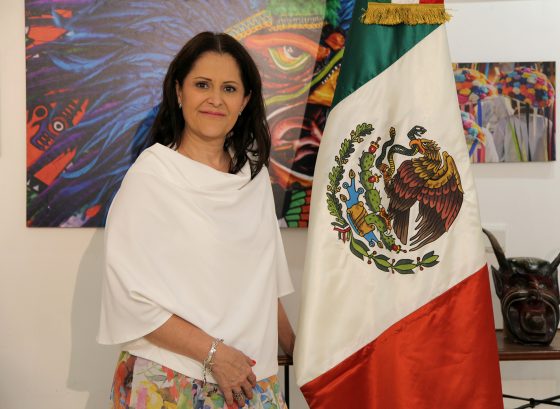“The First Pillar for the Peacebuilding Process is Fostering Development.” States Senegalese Ambassador to Iran

On Sunday, March 24, 2024, presidential elections in Senegal were peacefully held across the country. The winner of the election was Mr. Bassirou Diomaye Faye, a former tax inspector and a new face in the country’s politics. He, as the youngest president of Senegal, was released from prison just 10 days before the election. By promising to fight against corruption and reforming the political and economic system, he defeated his rival and promised change and transformation in the country. The election of Mr. Bassirou Diomaye Faye can provide a new opportunity to strengthen the ties between the two countries of Iran and Senegal. To this end, we have conducted an interview with H.E. Mr. Saliou Niang DIENG, Ambassador of the Republic of Senegal to Iran, which you will read below. Within this interview, political and economic relations between the two countries as well as the existing potentials to expand bilateral relations have been discussed.
AVA Diplomatic’s Exclusive Interview with
H.E. Mr. Saliou Niang DIENG, Ambassador of the Republic of Senegal to Iran
What is the political and economic position of the republic of Senegal in West Africa?
Thanks to its climate of peace and social and political stability, backed by a long diplomatic tradition, Senegal is an island of peace and stability in a West Africa plagued by multiple and multifaceted crises. Unlike many countries in Sub-Saharan Africa, Senegal has no records of military coup, civil war or religious conflict.
On the strength of its historic status as a “democratic exception”, Senegal has become a major political player, combining diplomacy of influence with multilateral economic development cooperation, particularly in the fight against terrorism.
Senegal’s political clout has enabled it to establish its presence in various decision-making bodies and major regional groupings, including the New Partnership for Africa’s Development (NEPAD), the United Nations (UN), the UN Security Council, the African Union (AU), the Economic Community of West African States (ECOWAS) and the Organization of the Islamic Cooperation (OIC).
Its long tradition of peace and democracy has helped to create a business environment conducive to investment.
In addition, Senegal has a very open economy. Senegal also benefits from a number of preferential trade agreements with several of the world’s major economies, including the European Union, China and the United States.
Senegal is a member of ECOWAS, a regional bloc of 15 countries (with a population of around 360 million) designed to promote economic integration in various sectors, including transport, energy, industry, agriculture, natural resources and trade.
Senegal is also a member of the West African Economic and Monetary Union (WAEMU), a regional organization of 8 countries and 112 million inhabitants, whose mission is to promote economic integration by strengthening the competitiveness of their economies within the framework of an open and competitive market and a harmonized legal environment.
Its membership of economic and monetary integration zones (ECOWAS and WAEMU) and its geographical position make Senegal a main gateway to major regional markets.
What were your most important positions before coming to Iran?
Before Tehran, I was Minister Counselor at the Permanent Mission of the Republic of Senegal to the United Nations. I have been also 1st counselor at the Embassy of Senegal to Paris. Before, I was the Head of the U.N Division of the Directory of Multilateral organizations of The Ministry of Foreign Affairs.
What is the current state of political relations between Iran and Senegal? What are the areas for extending cooperation between the two countries?
The political relations between Iran and Senegal are in very good shape. There are high level contacts between the leaders of the two countries. For instance, on the sidelines of the 15th meeting of the BRICS in Johannesburg, the former President of Senegal H.E.Mr. Macky SALL met H.E. Seyed Ebrahim Raisi. During this meeting they both expressed their desire to deepen the relationships between the two countries. Also H.E. Mr Amir Abdollahian met with his Senegalese counterpart H.E. Mrs Aïssata Tall SALL on the sidelines of the 52nd regular session of the human rights council in Geneva on February 2023.
There is also constant exchange of delegations between the two countries these two years. The Senegalese Minister of environment visited Iran on the 9 and 10th September 2023 to attend the international Conference on sand and dust storms.
From 25 to 29 September 2023, the Director for Asia-Pacific and the Middle East of Senegalese Ministry of Foreign Affairs visited Tehran at the invitation of the Director General for Africa of the Iranian Ministry of Foreign Affairs.
The Iranian Deputy Foreign Minister for political affairs Dr. Ali Bagheri Kani attended the 9th edition of the Forum on peace and security in Africa, held in Dakar, Senegal in November 2023.
Given that the political ties between the two countries are strong, the efforts to extend our cooperation should focus in economic, commercial and industrial fields.
What was the volume of bilateral trade between Iran and Senegal last year? How has this figure changed compared to previous years? What are the main export and import items between the two countries?
According to the OEC (The Observatory of Economic Complexity), in 2022, Senegal exported $67k to Iran. The main products exported from Senegal to Iran were non-fillet frozen fish ($54.5k), scrap iron ($10.9k), and crustaceans ($1.65k). During the last 26 years, the exports of Senegal to Iran have decreased at an annualized rate of 17.2%, from $9.01m in 1996 to $67k in 2022.
In 2022, Iran exported $17.4m to Senegal. The main products exported from Iran to Senegal were malt extract ($10.8m), edible offal ($2.19m), and cars ($1.63m). During the last 26 years the exports of Iran to Senegal have increased at an annualized rate of 20.5%, from $136k in 1996 to $17.4m in 2022.
When was the last meeting of the joint commission on economic cooperation between the two countries held, and how do you asses its role in developing relations between the two countries?
After 10 years of pause, Senegal hosted on December 2023 the 5th edition of the Joint commission on economic cooperation between the two countries. The joint commission session was very successful as it allowed both delegations review all the areas of bilateral cooperation between the two countries and paved the way for extending them further.
The focus was mainly made on the development of bilateral cooperation in areas of common interest to the public and private sectors of both countries, including agriculture, mining, energy, trade, industry, technology, research, training, health and tourism.
Six memoranda of understanding and cooperation agreements in the cultural, agricultural, legal, and judicial fields have been signed during this Joint commission.
To what extent can Iran and Senegal cooperate in the field of agriculture and industrial equipment?
Agriculture and industries are definitely areas where Senegal and Iran can do a lot in the light of the huge existing potentials between the two countries.
Regarding industrial cooperation, we have already an example of collaboration in the field of car production with SenIran Auto based in Senegal and co-owned by the two countries. This kind of partnership should be enhanced and extended to other areas such as food industries and manufacturing.
As for agriculture both parties agreed that it should be an area of priority of our cooperation. So, during the last Joint Commission held in December 2023 In Dakar, Senegal, we reached an agreement on the conclusion and signature of a Memorandum of Understanding on cooperation in the agricultural sector between the two countries which both expressed their readiness to implement joint projects in the fields of water and soil, agriculture, horticulture and aquaculture and in other related fields such as livestock and fisheries.
Both Delegations also expressed their desire to increase the volume of trade in agricultural products and their willingness to organize educational workshops and specialized visits in various areas of the agricultural sector.
Furthermore, the Parties agreed to cooperate in the field of agricultural research with the establishment of a general framework for direct collaboration between the Institut Sénégalais de Recherches Agricoles (ISRA) and the Iranian Agricultural Research Institute for the production of quality seeds.
What are the obstacles and challenges to the development of trade between the two countries?
 The main obstacles for the real development of trade between the two countries are of two types according to me.
The main obstacles for the real development of trade between the two countries are of two types according to me.
The first obstacle is caused by the economic and financial sanctions, which make it difficult to carry out economic and financial transactions.
The second one is related to the absence of direct channels of maritime transportation lines between the two countries.
During your tenure as Ambassador of Senegal to Iran, which provinces of Iran have you visited, and what is your view on the people and culture of Iran?
I have visited several provinces of Iran. I have been to Isfahan, Tabriz, Uremia, Masuleh, Nowshahr, Yazd, Mashhad, Qom, Hamedan, Abeyanee, Natanz, Kashan, Alasht Village and so on.
I was really impressed by the richness and diversity of Iranian culture and historical vestiges.
Everywhere I was, the Iranian hospitality was the same: I was warmly welcomed.
How do you assess the level of cultural interactions between Iran and Senegal? What are the plans for cultural exchange between the two countries?
The cultural interactions between Iran and Senegal are marginal despite the fact that the two countries signed February 11, 1974, in Dakar, Senegal, their first agreement on cultural, scientific and technical cooperation agreement. Furthermore, was signed on February 8, 1999, in Teheran, a Memorandum of understanding for cultural, scientific and educational cooperation between the two countries.
With this in mind, during the last joint Commission the Parties expressed their willingness to exchange experiences and experts, and to organize training workshops in the field of protection, restoration, recording and documentation of historic works and monuments.
They also expressed their willingness to participate in the organization of cultural and educational events, festivals and exhibitions for the supply and sale of handicrafts.
The Parties have expressed their willingness to elaborate and prepare the document of the cultural exchange program between the two countries. Thus, the basis for developing cultural cooperation between Iran and Senegal is now set.
What measures have been taken to strengthen scientific and technological cooperation between Iran and Senegal?
The main measure to strengthen scientific and technological cooperation between Iran and Senegal is the creation of a joint executive committee for cooperation in the fields of technology, innovation and the knowledge-based economy, focusing on the relevant sectors of both countries, in particular Iran’s Cooperation Center for Transformation and Progress decided during the last Joint Commission. The themes of this cooperation should be presented and determined by mutual agreement.
What cooperation do Iran and Senegal have in the fields of education, exchange of professors and students, conducting joint research, and awarding scholarships?
Senegal and Iran have already developed cooperation in the field of education. Since many years now, scholarships have been granted by Iran Government to several Senegalese students. There are following diverse areas of studies such as literature, petrol and gas, geo-physic etc. It was also created at the University Cheikh Anta DIOP of Dakar, a Department of Persian language. The university Al-Mostafa has also a campus in Dakar.
Furthermore, Iran and Senegal have shown their willingness, during the last joint commission, to cooperate in the field of technical and vocational training, in particular the development of partnerships in the social sciences, engineering and languages, and the mobility of teachers, students. The two countries also plan to develop cooperative relations based on exchanges and mobility between the medical faculties of Iranian and Senegalese universities, with a view in particular to conducting joint research projects.
How many Iranian and Senegalese tourists traveled to each other’s country last year? What steps have been taken to facilitate travel for tourists between the two countries? What are the challenges in developing tourism relations between the two countries?
During last year the Embassy delivered 51 visas while only 41 were granted the year before. I believe that there is a room for improvement and development of the tourism sector. In this regard, we need to overcome the main challenge which the lack of knowledge and existing potentials between the populations of the two countries. We should encourage more exchanges and movements between our populations. We need also more collaboration and organization of our relevant tourism sector actors.
During the last joint Commission, both parties expressed their willingness and readiness to collaborate in the field of tourism and leisure. This is the spirit of the memorandum of understanding on tourism cooperation signed on that occasion between the two countries.
What is the view of the Senegalese government on the recent developments in the Middle East and the Hamas-Israel war?
Senegal has openly expressed its concern and condemned the unbearable tragedy following the resumption of hostilities in the Israeli-Palestinian conflict.
As Chairman of the United Nations Committee on the Exercise of the Inalienable Rights of the Palestinian People, Senegal called for de-escalation and respect for international humanitarian law. We call for an immediate cease fire. We firmly believe that there can be no military solution to this murderous conflict.
So, we reiterate our strong attachment to a peaceful settlement of the conflict, in accordance with the objective set by the relevant United Nations resolutions of two independent and sovereign states: Israel and Palestine, each living within secure and internationally recognized borders.
What role can Iran, in cooperation with Senegal, play in the development process and peacebuilding in Africa?
I believe that the main role that Iran could play in this regard is to support the development of African countries by transferring technologies and offering them fair and win-win partnerships. The first pillar for peacebuilding process is fostering development.




